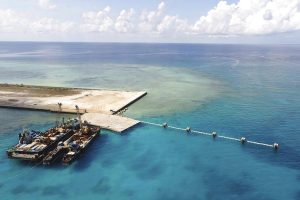The Philippines has sought an official explanation from China’s government after a Chinese coast guard vessel reportedly seized Chinese rocket debris from Filipino navy personnel in the disputed South China Sea, officials said yesterday.
Maria Theresa Daza, a spokesperson for the Philippine Department of Foreign Affairs, told journalists that a diplomatic note has been relayed to China for “clarification from the Chinese side over the incident,” the Associated Press reported.
The November 20 incident off the Philippine-occupied Thitu Island was the latest in a string of literally hundreds of incidents that have taken place in the regions where China’s “nine-dash line” maritime claim loops into the Philippine-claimed regions of the South China Sea.
In a November 21 statement reported by the Philippine News Agency, Vice Adm. Alberto Carlos, the commander of the military’s Palawan-based Western Command, said that Filipino sailors, using a long-range camera, spotted some “metallic” debris drifting near a sandbar of about 540 meters off the coast of Thitu Island. They set out on a boat and retrieved the floating object and started to tow it back to the island.
On the way back, they noticed that a China Coast Guard vessel “was approaching their location and subsequently blocked their pre-plotted course twice,” Carlos said. The Chinese vessel, which bore bow number 5203, then deployed an inflatable boat with personnel who “forcefully retrieved” the debris by cutting a towline attached to the Filipino sailors’ rubber boat. There remains no explanation for the series of thunder-like blasts that villagers on Thitu reported hearing on Sunday.
Under its contentious “nine-dash line” maritime claim, Beijing claims a large swathe of what Manila terms the West Philippine Sea, and Chinese vessels have encroached repeatedly into the country’s exclusive economic zone. In the first 70 days of Philippine President Ferdinand Marcos Jr.’s term, which began on July 1, the Philippines lodged 52 protests against Beijing’s “incursions” and “illegal presence” in the Philippine regions of the South China Sea. This came after the lodging of 388 official protests during the six-year term of Marcos’ predecessor Rodrigo Duterte.
It is unclear whether the Philippines will receive a satisfactory answer from China about the rocket debris. As the AP reported, China’s Foreign Ministry has simply denied that the fragments were seized forcibly. “The Philippine side salvaged and towed the object first. After friendly consultation at the site, the Philippine side returned the object to China, and China expressed appreciation for that,” ministry spokesperson Mao Ning said on November 21. “There was no such thing as interception or forcible seizure at the scene.”
The incident came just two days ahead of U.S. Vice President Kamala Harris’ visit to the Philippine island of Palawan, which lies around 500 kilometers from Thitu Island, the largest inhabited Philippine feature in the Kalayaan Island Group, as Manila refers to its occupied features in the South China Sea.
Speaking aboard a Philippine coast guard patrol ship docked in Puerto Princesa, Harris underscored Washington’s support to its long-time treaty ally “in the face of intimidation and coercion in the South China Sea,” an obvious reference to China.
“We must stand up for principles such as respect for sovereignty and territorial integrity, unimpeded lawful commerce, the peaceful resolution of disputes,” Harris added. “When the international rules-based order is threatened somewhere, it is threatened everywhere.”
































